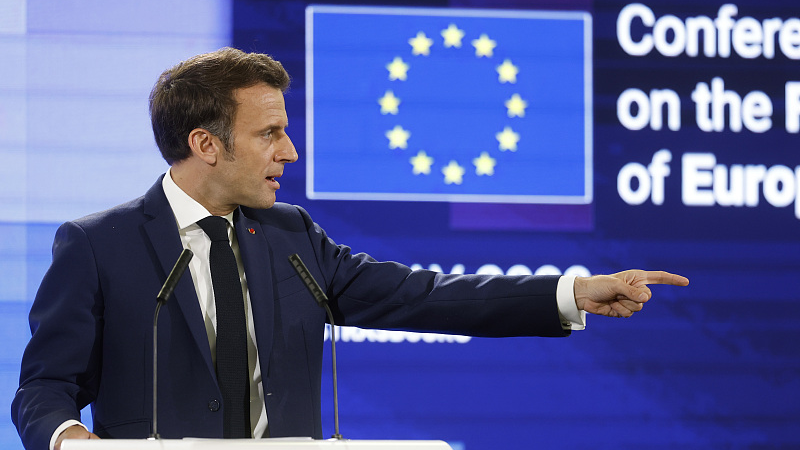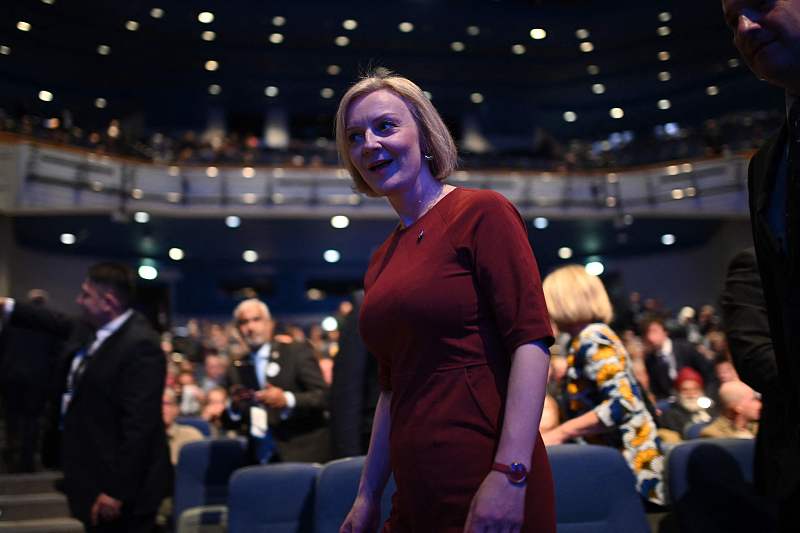
French President Emmanuel Macron gestures as he delivers a speech during the Conference on the Future of Europe, in Strasbourg, eastern France, May 9, 2022. /CFP
French President Emmanuel Macron gestures as he delivers a speech during the Conference on the Future of Europe, in Strasbourg, eastern France, May 9, 2022. /CFP
Editor's note: Freddie Reidy is a freelance writer based in London. He studied history and history of art at the University of Kent, Canterbury, specializing in Russian history and international politics. The article reflects the author's opinions, and not necessarily the views of CGTN.
On October 6, the Czech Republic's capital Prague is playing host to a new organization, the European Political Community (EPC). The initiative, conceived by French President Emanuel Macron, seeks to bring together the 27 EU members as well as 17 other nations outside of the European Union (EU) with the aim of building a political consensus on areas such as security, energy, transport and borders.
The wider and lofty aims of the grouping such as the "strengthen the security" may be laudable, but many nations appear wary over the true intentions of this new gathering.
The group of nations also includes many nations who are enduring acute diplomatic difficulties such as Cyprus, Greece and Türkiye in addition to Azerbaijan and Armenia, as well as Albania and Kosovo. Many fears are prevailing that there's so much diplomatic "baggage" that the likelihood of progress, let alone consensus, is more than ambitious.
There are also concerns over what the relationship between the EU and EPC is. Initially the EPC was a French-led initiative, but the project was approved by the EU who are now organizing the event. For the likes of Türkiye who has spent 35 years waiting for its EU membership to progress, there are some concerns that this is a French ploy to establish a glorified holding pattern with little or no chance of accession to full membership.
The foundation of such a French-led union is not without precedence either, as one Baltic diplomat said to Reuters, "Like the Mediterranean Union, it'll be a big French project without big success and real impact."
Despite the skepticism, the EPC has been strengthened by the acquiescence of Türkiye and the United Kingdom both nations bolstering the military and economic base of the group. In line with the cautious tone, Türkiye was at pains to signal that their acceptance would not be an abandonment of Ankara's wider EU membership objectives.
The UK's joining was something of a diplomatic coup so soon after Brexit. Nonetheless, it is understood that Prime Minister Liz Truss is keen to review the name of the organization, less it be seen as EU supplication by stealth. The UK is also keen to maintain the primacy of the G7 and G20 for geopolitical coordination and NATO for the military. Standpoints, which a wary United States, is also no doubt keen for the UK to articulate.

Britain's Prime Minister Liz Truss attends the opening day of the annual Conservative Party Conference in Birmingham, central England, October 2, 2022. /CFP
Britain's Prime Minister Liz Truss attends the opening day of the annual Conservative Party Conference in Birmingham, central England, October 2, 2022. /CFP
The EU is by no means deaf to these challenges. European Council President Charles Michel saying that "the United Kingdom is a friend… and like-minded partner" with another EU diplomat adding, "the British took a very pragmatic tactic: if you cannot 'kill' the strange initiative, it is better to engage deeply and to direct it in your way."
It is highly likely that many a nation will be heading to the Czech Republic with a similar strategy in mind. However, it could also be the case that the formation of a new grouping outside of the EU framework and its necessity for consensus, could therefore act as a device for forming broad alliances without the need for unanimity.
Recently, there has been a spate of "holdouts" by member states on a variety of issues, which has prevented the vast majority of the Union in responding to events or passing budgets in the way it wishes.
Other than the coalescence of a broad coalition of nations, there are further indications that the EPC could be more successful than its predecessors. At a preliminary meeting, the more skeptical Baltic states appear to be reassured by the direction of events, with one diplomat saying, "at the start we were afraid the EPC would be an alternative to EU membership but, as it develops now, I don't think so."
The future success of the EPC will be wed to whether or not anything can be achieved among this group of nations that could not be achieved at other multilateral set-pieces.
Furthermore, there is a danger that the EU's closeness to the EPC could be a Trojan horse holding pattern for aspiring members, as well as a back door to securing a stronger and more authoritative EU voice on the international stage.
Nevertheless, if the policy initiatives are broad enough to unite and limited enough to be deliverable, then further dialogue at a time of global instability may not be such a bad thing.
(If you want to contribute and have specific expertise, please contact us at opinions@cgtn.com. Follow @thouse_opinions on Twitter to discover the latest commentaries on CGTN Opinion Section.)